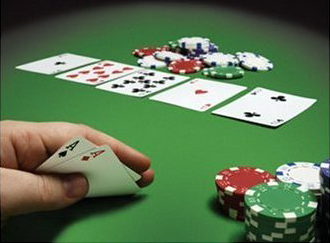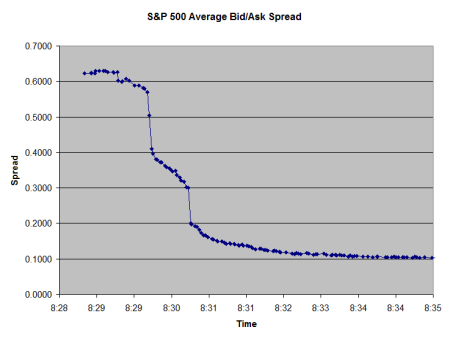When learning to trade, there are many areas to work on. You have to find an edge. You have to have screen time to learn what different market moves look like as they unfold. You have to have a trading plan and back/forward test your ideas. You have to understand what your stocks / instruments behave like. You may paper trade in a stock market simulator. Like I describe in my WWJT post, many worry about minute details before they institute a foundation (if they ever do). Those details are important, but you need the foundation first. And one of the best ways to practice the foundational skills is through that old trader favorite: Texas Hold’Em Poker.
What are the foundational skills I’m talking about? Well, as the Phantom of the Pits says, Rule #1 is cut your losses. Lose quickly and lose small. Rule #2 is press your winners. You need to have an idea of what an edge looks like. You need to recognize when the markets are likely to be bluffing and when they are serious about a move. You have to accept getting bad beats. You can’t bet so big that you have to win any particular hand. If you play poker right, you are working like the house, not the gambler. Without practicing and implementing these skills, whether in trading or in poker, you are just blindly gambling–and you’re just the kind of sucker the casinos and the brokers love to see coming in the door. My biggest battle has always been psychological. And I’ve been learning a lot more by playing hands of poker than I ever did with a stock simulator!
To start with, let’s talk about bet size (or for trading, position sizing). While playing my Texas Hold’em games, the first big thing I noticed is that my bet size had A LOT to do with my psychology during the hand. I had a fake $10,000 to start, and I wanted to grow it. I started at the recommended table, where you buy in with $2000 and blinds were $5/10. Typical pots were going for around $500. If you lost four times you were blown out of the game, and took a 20% drawdown on your account.
As I started to play, I realized that I NEEDED TO WIN on hands where I had put a lot in to the pot. I pressed sub-par hands to “see if it would bail me out”. It was too painful to walk away from the money already “lost” on the table. Sound familiar for trading?
I realized this and decided to go down to a smaller table. I bought in with $200 and blinds were $1/2. Now, I had enough of a bankroll that it didn’t matter if I walked away from a pot. I was paying $20-40 to fold instead of 10 times that amount. I was suddenly free to be picky. I could fold without pain. I could wait for my hand, where I knew I had a huge edge, and then press. I ended up doubling my money. I found the hands in general started to get a bit boring, and that’s how I knew I was doing it right.
The lesson for trading? Bet small enough that you can walk away. Don’t bet so large that you CAN’T be stopped out. You have to be willing to walk from every trade you make with the loss without flinching. If not, you are sizing your positions too big. Any one trade can make you, with a huge runner. But you CANNOT allow any one trade to break you. Fold early and fold often. Make it boring. Bring enough of a bankroll to make a stop loss painless. Then you have a foundation where your psychology can work for you, not against you. Remember: you will win when the other guy makes the mistakes you used to make. He’ll press on a sub-par trade because he can’t afford to take the loss. But lose he shall.
More ideas to come.
When I can, I play as “pro” on the free VIP Poker app for iPhone:
Link to iTunes page



Facing Reality, and My Dilemma
November 16, 2011Anyone familiar with my roughly 6 year long part-time trading history knows I’m a net loser. Never had a profitable year ever. Not one. I’ve ground down three small accounts now, trade by trade, loss by loss (with the occasional win, though). I’ve done the spectacular blowout before, losing 30%+ of the account at once, done the revenge trade campaign, but this time, I’ve just been wrong in my timing and direction more than I have been right. No big blowout trades, just consistently losing 1R at a time. I’ve matured to be in control of myself, I just can’t bring home the results.
So as I near the close of another losing year of trading, I see that yet again it is time to stop trading. The discretionary setups I have been playing just are not working, as evidenced by my win/loss rate and my PnL. While this is a psychological blow to me, it’s not a big monetary blow. Nothing in my life changes because of the lost money. I make plenty of money as an engineer to cover our family’s lifestyle and save for retirement. Basically, the middle class dream. But there is nowhere else to go. No more upside, and very little personal freedom. That’s what trading represents to me: being in control of my own life. So far, I have not succeeded. While I have a lot of success in many areas, especially the ones that count (health, family, career), this one is where my heart is set. Either I need to give it up or try a different approach. Since I don’t have the approach right now, I’m stopping until I do.
So this is not an emotional breakdown, I didn’t go tilt, no real damage done. But I am sad that I still can’t win at trading. I will likely study some more, watch the markets, maybe make another try next year.
Now, the dilemma: what do I do with my programming/blogging? I feel like I have no business writing about trading, making indicators and software for other traders if I can’t even do it myself. It just doesn’t feel right. If I’m trying myself, and having success, then I feel like sharing and working is honestly good. What I worry about is this: if I’m not a good trader, then people come looking to me for something that will help them find success. I’m no snake oil salesman. I don’t want to prey on people and their desperation to find something that works. I won’t do it. So that leaves me with the question: is it ethical to do the programming work when I can’t make money myself using the same tools? Say the answer is yes. Then is it enough business to replace my income and do it full time? So far, the answer is far from yes. So where should I invest my skills to have the greatest chance at my end goal: financial freedom, while I am still “young”? Again, I don’t know.
So that’s where I’m at. I believe it is possible to make money at trading, but it is far harder than even I thought. If I can’t do it, how can I help anyone else do it? And if I don’t trade or help others to, then what should I do to meet my goals? Welcome to the inside of my head.
Tags:hypocrisy, lose, Profitability, Trading, WIN
Posted in Meta, Psychology, Serious Commentary | 28 Comments »